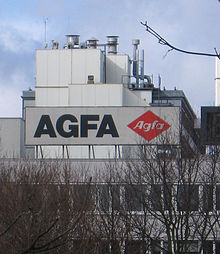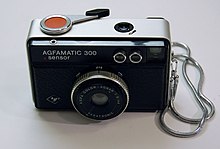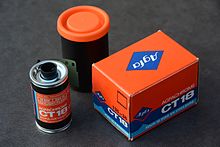Agfa-Gevaert
 | |
Type | Public |
|---|---|
| Traded as | Euronext: AGFB |
| Industry | Imaging and IT company |
| Founded | 1867 (Aktiengesellschaft für Anilinfabrikation) 1894, Gevaert & Co. 1964 (Agfa-Gevaert) |
| Headquarters | Mortsel, Belgium |
Key people | Christian Reinaudo, CEO |
| Revenue | € 2,537 million (2016) [1] |
Number of employees | 11,728 (Dec. 2011) |
| Website | www.agfa.com |

Agfa logo.

Agfacolor slide from Zakopane in Poland, 1938
Agfa-Gevaert N.V. (Agfa) is a Belgian-German multinational corporation that develops, manufactures, and distributes analogue and digital imaging products and systems, as well as IT solutions. The company has three divisions. Agfa Graphics offers integrated prepress and industrial inkjet systems to the printing and graphics industries. Agfa HealthCare supplies hospitals and other care organisations with imaging products and systems, as well as information systems. Agfa Specialty Products supplies products to various industrial markets. It is part of the Agfa Materials organization. In addition to the Agfa Specialty Products activities, Agfa Materials also supplies film and related products to Agfa Graphics and Agfa HealthCare.
Agfa film and cameras were once prominent consumer products. However, in 2004, the consumer imaging division was sold to a company founded via management buyout. AgfaPhoto GmbH, as the new company was called, filed for bankruptcy after just one year.[2] The brands are now licensed to other companies by AgfaPhoto Holding GmbH, a holding firm. Following this sale, Agfa-Gevaert's commerce today is 100% business-to-business.
Contents
1 Company structure
1.1 Agfa Graphics
1.2 Agfa HealthCare
1.2.1 Medical Imaging systems
1.2.2 IT solutions
1.3 Agfa Specialty Products
2 Timeline
3 Products
3.1 Agfa Cameras
3.1.1 SLR
3.2 Agfa Slide Projectors
3.3 Agfa Consumer and Professional Films
3.4 Agfa Darkroom Equipment
3.5 Agfa Papers
4 See also
5 References
6 External links
Company structure
Headquartered in Mortsel, Belgium, Agfa has sales organisations in 40 countries. In countries where Agfa does not have its own sales organisation, the market is served by a network of agents and representatives. At the end of 2011, the company had 11,728 employees (full-time equivalent permanent) worldwide. Agfa has manufacturing plants around the world. The largest production and research centres are based in Belgium, the United States, Canada, Germany, France, Italy and China. Net sales for 2011 totalled 3,023 million euros.
Agfa is organised into three business groups as follows:
Agfa Graphics
Digital and analogue prepress systems, software, and consumables.
- Computer-to-film and computer-to-plate equipment.
- Prepress & publish workflow software.
- Consumables: graphic film, analogue and digital printing plates.
- Digital proofing systems.
- Technical services.
Industrial inkjet systems and solutions.
- Wide format printing systems.
- Anapurna and Jeti printer families: typically used to produce posters, banners and displays.
- M-Press family high-end flatbed presses, designed to replace traditional equipment for all possible screen printing jobs.
- Wide format media.
Agfa HealthCare
Medical Imaging systems
- Conventional radiography.
- Screen films (conventional X-ray films).
- Developing equipment.
- Chemistry.
- Digital radiography.
- Integrated computed radiography solutions.
- Integrated direct radiography solutions.
- Hardcopy printers and film.
IT solutions
Developer of medical imaging information systems. Agfa Healthcare's main offices are in Mortsel (Belgium), Ghent (Belgium), Waterloo (Ontario Canada), Vienna (Austria) and Bonn (Germany).
- Radiology IT (brand name IMPAX).
Picture Archiving and Communication Systems(PACS).
Radiology Information Systems (RIS).- Speech recognition.
- Imaging repositories.
- Cardiology IT.
- PACS for cardiology IT and CardioVascular Information Systems.
ECG management systems.
- Enterprise IT (main brand name: ORBIS).
Hospital Information Systems (HIS).- Clinical Information Systems (CIS).
Laboratory Information Systems (LIS).- Document Management Systems.
Agfa Specialty Products
Agfa Specialty Products supplies products to a variety of industries.
- Traditional film products
- Sound recording film and print film for the movie industry.
- Films, chemicals, photo paper and software for aerial photography.
- Microfilm
- Photo-tooling films for the production of Printed Circuit Boards.
Nondestructive testing (NDT) film (as the exclusive manufacturer of General Electric's NDT X-ray films and related chemistry.
- New developments
- Synthetic paper (SYNAPS brand).
- Materials and consumables for the production of ID-documents.
- Conductive polymer materials (printing inks, pastes and emulsions) for the production of transparent electrodes used in compact electronic devices (Orgacon brand).
- Industrial inkjet inks.
- Membranes for the electrolysis of water (Zirfon Perl brand).
Timeline
- 1867 The company Aktiengesellschaft für Anilinfabrikation (Corporation for Aniline Production) was founded in Rummelsburg (now in the Lichtenberg borough of Berlin) as a manufacturer of dyes and stains. It became a public limited company in 1873. The founders were Paul Mendelssohn Bartholdy (son of composer Felix Mendelssohn Bartholdy) and Carl Alexander von Martius.
- 1894 The company L. Gevaert & Cie was founded in Antwerp, Belgium, arising from the workshop for the manufacture of photographic paper belonging to Lieven Gevaert.
- 1897 Appearance of the Agfa trade mark.
- 1898 Introduction of X-ray plates and film products.
- 1903 Production of first cinematographic film.
- 1925 As part of the consolidation of the German chemical industry, Agfa became part of IG Farben.[3] The photographic activities are combined with those of Bayer, including a camera factory in Munich.
- 1928 Acquired Ansco, an American photographic manufacturer, whose products were sold under the Agfa-Ansco brand name.
- 1936 Agfacolor Neu a pioneering color film for amateurs and professionals.
- 1940 Agfacolor negative-positive color material is used for the first time for a feature film Frauen sind doch bessere Diplomaten by the German UFA production company.
- 1941 American assets were seized during World War II as enemy property and became General Aniline and Film Corp., whose photographic products reverted to the Ansco brand name.
- 1942 Introduction of intensifying screen products.
- 1945 When the Allies broke up IG Farben to reduce the size of German chemical industry, Agfa reappeared as an individual business. An Agfa plant located in what was to become East Germany became the foundation of ORWO.
- 1952 Re-establishment of Agfa AG as a wholly owned subsidiary of Bayer in Leverkusen.
- 1964 Merger of Agfa AG and Gevaert Photo-Producten N.V. with Bayer AG and Gevaert each holding a 50% interest in the new operating company.
- 1970 Introduction of Agfacontour Professional Sheet Film.
- 1972 Introduction of mammography film / screen products.
- 1981 Bayer buys out Gevaert and becomes 100% owner.
- 1988 Acquisition of Compugraphic Corporation (prepress systems).
- 1990
- Sale of magnetic tape business.
- Introduction of Computed Radiography (CR) products.
- 1994 Introduction of PACS products.
- 1996 Acquisition of Hoechst's printing plate and proofing business.
- 1997 Sale of the company's film recorder division to German CCG Digital Image Technology.[4]
- 1998
- Acquisition of Dupont's offset printing and graphic arts film business.
- Sale of the company's Copier Systems business to Lanier Worldwide Inc.
- Acquisition of CEA AB (X-ray film products).
- Acquisition of Monotype Typography Inc.
- 1999
- Acquisition of Sterling Diagnostic Imaging (X-ray film and equipment).
- Separation of Agfa from Bayer. Initial public offering of Agfa-Gevaert shares on June 1. Agfa listed on Brussels and Frankfurt stock exchanges.
- 2000
- Acquisition of Krautkramer, a producer of ultrasonic systems for non-destructive testing.
- Acquisition of Quadrat, a Ghent-based European producer of radiology information systems.
- 2001
- Acquisition of Autologic, an American producer of systems for prepress automation.
- Acquisition of Talk Technology, a producer of medical voice recognition systems.
- Acquisition of the German company Seifert and the American company Pantak, producers of industrial X-ray equipment for non-destructive testing applications.
- Acquisition of a minority interest in MediVision, a developer and manufacturer of digital imaging systems for ophthalmology.
- Agfa stopped its desktop scanners and digital camera business in September 2001. Agfa does not provide any further support.
- 2002
- Acquisition of Mitra Imaging Inc., a developer of medical imaging and information systems for healthcare.
- Bayer sells its remaining 30% stake in Agfa.
- 2003
- Opening of new printing plate factory in Wuxi, China.
- Sale of non-destructive testing business to General Electric.
- 2004
- Acquisition of Dotrix, a Belgian producer of digital colour printing systems for industrial applications.
- Acquisition of Lastra, an Italian manufacturer of plates, chemicals and equipment for the offset printing industry.
- Sale of the consumer imaging division to a company founded via management buy out, named AgfaPhoto, and held by an investment company. After one year, AgfaPhoto files for bankruptcy.
- Acquisition of ProImage, an Israeli developer of browser-based digital workflow solutions for the newspaper and printing industries.
- Acquisition of Symphonie On Line, a French information technology company and developer of EPR (electronic patient record) systems.
- Sale of Agfa Monotype Corporation, a provider of fonts and font-related software technology, to Boston-based private equity investor TA Associates.
- 2005
- Acquisition of GWI, a German developer of healthcare information systems for medical records, nursing, business management, and facility administration.
- Acquisition of Heartlab, Inc., a U.S. developer of cardiology image and information management systems.
- Acquisition of Med2Rad an Italian developer of radiology information systems.
- Introduction of industrial inkjet products.
- 2009
- Acquisition of Insight Agents, a European developer and producer of contrast media.
- Acquisition of Gandi Innovations, a producer of large-format inkjet systems.
- 2010
- Agfa Graphics and Shenzhen Brothers create the Agfa Graphics Asia joint venture to reinforce their position in the Greater China and ASEAN region.
- Acquisition of the Harold M. Pitman Company a US supplier of products and systems for the graphic industry.
- 2011 Acquisition of WPD, a Brazilian supplier of healthcare IT systems.
Products

Agfa Box
In 2004, Agfa-Gevaert withdrew from the consumer market, including photographic film, cameras and other photographic equipment.
Because Agfa-Gevaert still produce photographic films for the aerial photography market, it is still possible to buy fresh, Agfa-produced photographic films for use in consumer cameras. They are sold by the Lomography Society and Rollei and are branded accordingly. This is because those companies purchase the aerial photography film from Agfa-Gevaert, and then cut and package it into consumer photographic formats.
As of 2012, such products carry a small Agfa logo discreetly on their packaging, but are not sold as Agfa branded products.
By contrast, Agfaphoto branded photographic films are not made by Agfa-Gevaert at all, originally having been made by the now closed Ferrania plant in Italy. Agfaphoto films are now produced by Fujifilm in Japan for Lupus Imaging Media.
Agfa Cameras

Agfa Jsolette

Agfa Isolette

Agfa Agfamatic 300 Sensor

Various Agfa Movex 8 mm home movie cameras

Agfa Optima 1035 Sensor

Agfa Agfachrome CT18, film for colour slides with original box (1981)
Agfa produced a range of cameras which included:
- Ambiflex
Silette series- Clipper
- Billy
- Record
- Isolette
Isola series- Click
- Clack
- Optima series, e.g. Optima 1A
- Optima Sensor series, e.g. Optima 1535 Sensor and Optima Flash Sensor
- Selectronic S series
- Agfamatic series
- Agfamatic Pocket series
- Agfa Mini
- matching accessories like flashguns
SLR
- Agfa Flexilette
Selectronic series (rebranded products of Chinon)[5][6]
Agfa Slide Projectors
Roughly in temporal order, including:
- Agfa Opticus 100
- Agfa Agfacolor 50 automatic
Agfa Diamator series, like models H, m, 1500
Agfa Consumer and Professional Films
Black & White films:
- Agfa PD16
- Agfapan 25, 100 and 400
- Agfapan APX 25, 100 and 400 (revivals of 100 and 400 emulsion were announced by Adox)
- Isopan ISS (Super Special)
- Isopan F (Fine Grain)
- Isopan Ultra
- Isopan Record
- Agfa Vario-XL (C-41 process chromogenic film)
- Dia-Direct (reversal film)
- Scala (reversal film)
- Agfacontour Professional film
Colour Reversal (slide) films:
- Agfacolor Neu
- Agfachrome CT 18 and CT 21
- Agfachrome series
- Agfachrome R 100 S
- Agfachrome 50 S and 50 L Professional
- Agfachrome RS and RS Plus Professional series
- Agfachrome RSX and RSX II Professional series
- Agfachrome CT, CTx and CT Precisa series (excluding New Agfaphoto CT Precisa 100)
Colour Negative films:
- Agfacolor CN14, CN17, CN17M, CN17 Special, CNS and CNS2
- Agfacolor series
- Agfacolor XR series
- Agfacolor XRG series
- Agfacolor XRS Professional series
- Agfacolor Optima, Optima II and New Optima Professional series
- Agfacolor Portrait 160 Professional
- Agfacolor Ultra 50 Professional and Ultra 100
- Agfacolor Vista series (excluding New Agfaphoto Vista 200)
While Agfa has retired from the photography branch, and the Agfaphoto brand was sold to a reseller named Lupus Imaging, the surviving Belgian industrial branch of Agfa continues to produce, among other things, w/b, colour negative and colour reversal materials for aerial photography. Some of these are cut to the usual 135 and 120 formats by Maco and distributed under the brand name Rollei. Specifically, these re-branded Agfa materials include Rollei Retro 80S, 200S and 400S, Digibase CN200 and CR200.
Agfa Darkroom Equipment
Agfa Varioscop enlargers
Agfa Variomat print easels for automatic exposure- Darkroom safety lights
- Agfa Rondinax and Rondix daylight developing tanks
Agfa Papers
Agfa photographic papers were of very high quality and included brands such as:
- Brovira
- Portriga Rapid
- Lupex
The production of material identical to the last generation of fibre-based and resin coated photographic Agfa Multigrade papers has been resumed by Adox.[7]
See also
| Wikimedia Commons has media related to Agfa-Gevaert. |
- AgfaPhoto
- Agfacolor
- Gevacolor
- André Leysen
- List of photographic equipment makers
- Christian Reinaudo
- List of photographic films
- List of discontinued photographic films
- Mixlink
References
^ Agfa-Gevaert publishes its full year 2016 results, agfa.com. Article dated 2015-03-11, retrieved 2017-03-08.
^ AgfaPhoto files for insolvency, dpreview.com. Article dated 2005-05-27, retrieved 2007-03-04.
^ Ernst Bäumler: "100 Jahre Chemie", 1963, issued on the 100th anniversary of the Farbwerke Hoechst AG
^ About CCG Digital Image Technology Archived January 29, 2009, at the Wayback Machine, definity35mm.com, retrieved 2009-01-11.
^ alf sigaro Alfred+ Add Contact. "Agfa Selectronic 2". Flickr.com. Retrieved 2012-01-07..mw-parser-output cite.citationfont-style:inherit.mw-parser-output .citation qquotes:"""""""'""'".mw-parser-output .citation .cs1-lock-free abackground:url("//upload.wikimedia.org/wikipedia/commons/thumb/6/65/Lock-green.svg/9px-Lock-green.svg.png")no-repeat;background-position:right .1em center.mw-parser-output .citation .cs1-lock-limited a,.mw-parser-output .citation .cs1-lock-registration abackground:url("//upload.wikimedia.org/wikipedia/commons/thumb/d/d6/Lock-gray-alt-2.svg/9px-Lock-gray-alt-2.svg.png")no-repeat;background-position:right .1em center.mw-parser-output .citation .cs1-lock-subscription abackground:url("//upload.wikimedia.org/wikipedia/commons/thumb/a/aa/Lock-red-alt-2.svg/9px-Lock-red-alt-2.svg.png")no-repeat;background-position:right .1em center.mw-parser-output .cs1-subscription,.mw-parser-output .cs1-registrationcolor:#555.mw-parser-output .cs1-subscription span,.mw-parser-output .cs1-registration spanborder-bottom:1px dotted;cursor:help.mw-parser-output .cs1-ws-icon abackground:url("//upload.wikimedia.org/wikipedia/commons/thumb/4/4c/Wikisource-logo.svg/12px-Wikisource-logo.svg.png")no-repeat;background-position:right .1em center.mw-parser-output code.cs1-codecolor:inherit;background:inherit;border:inherit;padding:inherit.mw-parser-output .cs1-hidden-errordisplay:none;font-size:100%.mw-parser-output .cs1-visible-errorfont-size:100%.mw-parser-output .cs1-maintdisplay:none;color:#33aa33;margin-left:0.3em.mw-parser-output .cs1-subscription,.mw-parser-output .cs1-registration,.mw-parser-output .cs1-formatfont-size:95%.mw-parser-output .cs1-kern-left,.mw-parser-output .cs1-kern-wl-leftpadding-left:0.2em.mw-parser-output .cs1-kern-right,.mw-parser-output .cs1-kern-wl-rightpadding-right:0.2em
^ alf sigaro Alfred+ Add Contact. "Agfa Selectronic 3". Flickr.com. Retrieved 2012-01-07.
^ adox.de
External links
- Official website
AgfaPhoto GmbH - Consumer imaging division which was sold off.